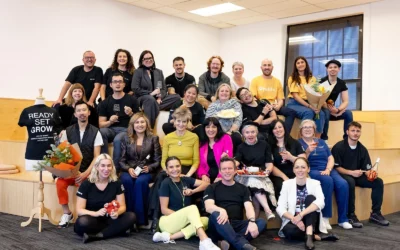As working from home becomes an entrenched part of our working lives, we are now turning our attention to the realities and rituals of a new way of working. This means finding personal ways to incorporate professional practices, and vice versa. It also means incorporating community and social standards into the formal-informal spaces we find ourselves in.
One of the inspiring practices we have seen develop over the last few years has been the respect afforded to our indigenous communities. The “Acknowledgement of Country” allows us to pay our respect to the Traditional Custodians of the lands on which we meet and work. Some organisations go so far as to paint these acknowledgements on the walls of their buildings – or create print works for the board and meeting rooms. Some incorporate it into their processes and meeting rituals.
And while in a professional setting we have become used to these practices, it’s not immediately clear how to translate this to the working from home environment. After all, we may not actually know where everyone is located in an online meeting. We may not be prepared with the right words to pay our respects.
The NSW Public Service Commission (PSC) have developed some handy policies and guidelines for working from home, including approaches to cultural events, employee wellbeing and Acknowledgement of Country.
The PSC have two main approaches and base each on the physical location of the host of the meeting or webinar:
When you know who the Traditional Custodians are for the land on which you are hosting the meeting
The recommended form of words are set out below:
I acknowledge that I am hosting/recording this meeting/webinar from the lands of the [insert Traditional Custodians name].
I also acknowledge the Traditional Custodians of the various lands on which you all work today and the Aboriginal and Torres Strait Islander people participating in this [meeting/webinar].
I pay my respects to Elders past, present and emerging and celebrate the diversity of Aboriginal peoples and their ongoing cultures and connections to the lands and waters of NSW.
When you DON’T know who the Traditional Custodians are for the land on which you are hosting the meeting
The recommended form of words are set out below:
I acknowledge the Traditional Custodians of the various lands on which we work today and the Aboriginal and Torres Strait Islander people participating in this meeting/webinar.
I pay my respects to Elders past, present and emerging, and recognise and celebrate the diversity of Aboriginal peoples and their ongoing cultures and connections to the lands and waters of NSW.
Be sure to adapt and adjust your Acknowledgement of Country to suit your location and style of meeting. Also be aware that there is a difference between and Acknowledge of Country and a Welcome to Country (the latter being performed by Traditional Custodians or Aboriginal Elders when welcoming visitors to their lands).



